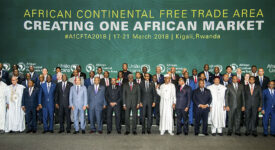Tunisia’s most recent presidential and parliamentary elections, held in September and October 2019, were major milestones in its democratisation process. The rise of anti-party figures and radical movements reminded Tunisia’s political elites that deep socio-economic inequality and corruption continue to destabilise the country’s fragile political system. The fragmentation of the political landscape shows that the consensus in place since 2014 – which created stability by ending political polarisation – has reached its limits. The consensus eventually led many voters to reject elites’ perpetuation of the socio-economic and cultural system of the Ben Ali regime. This process came to define the 2019 elections, which saw a sharp decline in support for Tunisia’s largest parties and the emergence of poorly articulated political movements – some of which made radical demands on issues such as morality in public life, as well as sovereignty.
Accordingly, the elections reordered the political landscape in important ways. The fragmentation of secular forces, combined with Ennahda’s electoral losses, put an end to the transactional compromises that had shaped Tunisia’s politics in the preceding five years. The crisis that engulfed parties unable to meet the people’s demands, and the interplay of old and new political divisions, has created an environment in which uncertainty prevails. A January 2020 no-confidence vote in Islamist-backed prime minister-designate Habib Jemli, and delays in forming an administration led by Elyes Fakhfakh, demonstrated the difficulty of forming the kind of effective and stable government needed to address the socio-economic problems that have plagued Tunisia since 2011.
And Covid-19 has created a new dynamic within this transition period. The pandemic exacerbates long-term challenges such as an economic crisis, social and regional inequality, inadequate healthcare, and political instability in ways that will test the capacity and unity of the ruling coalition. However, covid-19 could also become a catalyst for economic restructuring, as it provides an opportunity to tackle broad challenges and create agreements to share the burden of painful reforms between various groups. Despite the political inertia of recent years, there is now an emerging consensus among Tunisian elites that they should end the war of attrition that special interest groups have long waged against attempts at economic reform. Unless they make the important trade-offs and other decisions needed to achieve this, Tunisia’s political leaders will risk further undermining the legitimacy of state institutions. The resulting rise in economic and social tension could empower anti-democratic forces and destabilise the country. More than ever, the challenges Tunisia currently faces require strong political leadership.
Tunisia cannot find a solution to its social and economic problems without the support of its international partners, especially the European Union. The EU and its member states should actively push the Tunisian government to take the path of reform. The country’s sources of external financing have begun to dry up as the international community grows weary of the sluggishness of its reforms. But international financial institutions, creditors, and investors need to be flexible if the Tunisian government is to carve out the political space to implement substantive economic reforms. The EU should help Tunisia reach agreements with other international partners on debt restructuring, providing the government with some room for manoeuvre. The bloc can play an important role by encouraging the development of expertise on economic governance, building up the capacity of the Conseil d’Analyse Economique – which is the chief advisory body to the prime minister on economic policy – and the Institut Tunisien d’Etudes Quantitatives, as well as think-tanks and research centres. Given that an effective response to the economic and social problems created by covid-19 will require innovative thinking, these institutions could play a major role in advising the government, exploring policy options, and generating public debate on economic governance.
Beyond finance, Tunisia needs to engage in a strategic dialogue with the EU. With the arrival of a new leadership in Brussels and the 2019 elections in Tunisia, the sides can open a new chapter in their relationship. Many in Tunis perceive the European Neighbourhood Policy framework as excessively bureaucratic and driven mainly by technocrats. There is an urgent need to renew the partnership’s priorities and politicise this framework. A strategic dialogue between Tunisia and the EU would allow for a major rethink of their priorities for 2021-2027. The country needs a political partnership with the bloc – and this would be in line with the European Commission’s new emphasis on geopolitics.
The strategic dialogue should cover the modernisation of the Tunisian economy; commercial innovation; the green economy; the reconfiguration of supply chains; digitalisation; trade; investment; and, of course, security and migration issues. Such a dialogue would provide incentives for Tunisian political and economic elites to implement reforms, as they could benefit from integration with the European market. Most importantly, the process would allow the EU and Tunisia to identify their common interests – beyond the financial assistance and trade relations that, so far, have been the exclusive focus of their talks on a Deep and Comprehensive Free Trade Agreement. A strategic partnership would be a source of stability for Tunisia in an increasingly uncertain economic and security environment.
Business as usual is not an option for EU-Tunisia relations. The sides need to build a creative framework for their relationship and to come up with new instruments to deal with the changing political situation in Tunisia. This would help them address the increasingly sovereigntist public mood in the country; geopolitical turmoil in the Maghreb; rising security concerns mainly related to the conflict in Libya; and socio-economic challenges created by the coronavirus. Tunisia is at a delicate moment in its transition and these daunting challenges are a stress test for EU-Tunisia relations. All these trends heighten the need for the EU and Tunisia to rejuvenate their partnership in ways that protect their common interests. By doing so, the EU could become the external anchor Tunisia needs to consolidate its democracy.
‘Reform from Crisis: How Tunisia Can Use Covid-19 as an Opportunity’ – Policy Brief by Thierry Brésillon and Hamza Meddeb – European Council on Foreign Relations / ECFR.
The Policy Brief can be downloaded here







